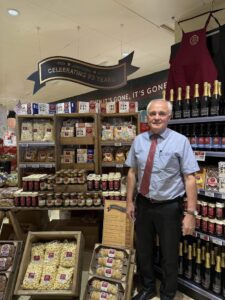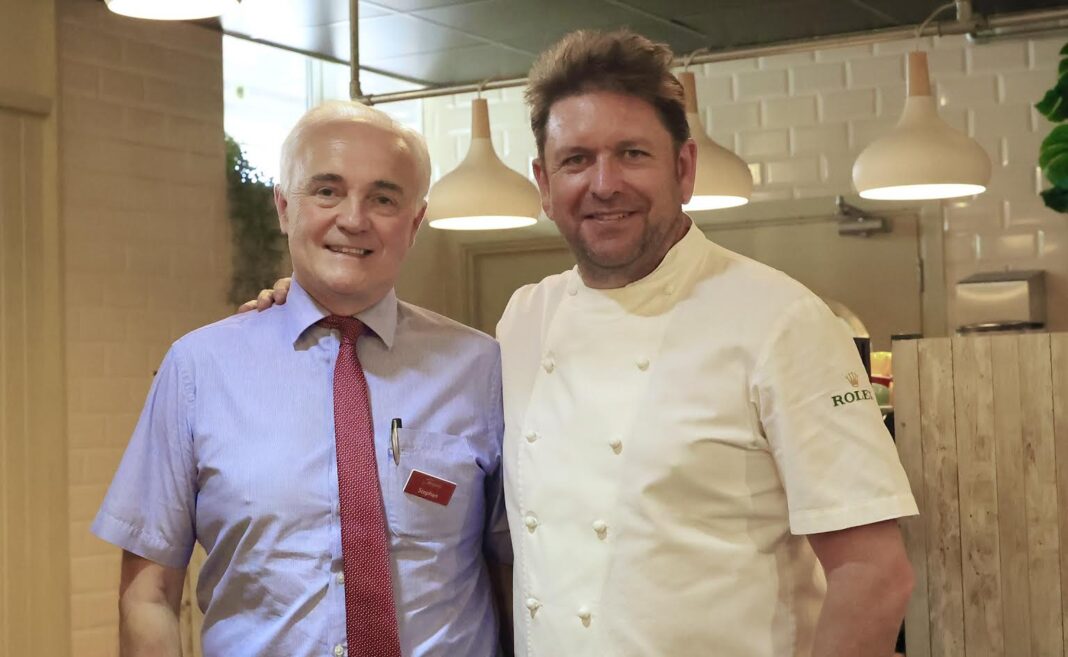We rightly shout about the independent shops and businesses in Rye, but, says Sarah Broadbent from Rye Chamber of Commerce, shouldn’t we also celebrate one of the town’s oldest and biggest at a time when it could be facing its biggest challenge yet – a rival supermarket in Rye.
In a world where retail is overshadowed by online behemoth Amazon, our shop owners work incredibly hard to keep their businesses going through the strength of their own unique offering, their style, their presence, their personality. We champion them for ensuring our high street isn’t a homogenous and bland line up of the same shops that you see in every town up and down the country. Each of those businesses is part of a complex ecosystem that makes the place and personality of Rye distinctive – they not only work individually to earn a living, but they work collectively to make a shopping trip to this particular town, and this particular part of the world, an experience that is memorable. This is no mean feat in the current climate, and for a town that relies on the visitor economy we cannot underestimate its importance.
And yet, there are some who don’t recognise that there is one retailer in town who set the precedent for this, and they’ve been holding true to that for 90 years. We are almost entirely unique in having an independent grocery retail group. A retailer that has weathered all sorts of economic storms and has stayed true to its values throughout.
Jempson’s is a rare breed indeed.
Latest figures show there are 32,012 supermarkets in the UK, and Tesco has the largest market share. Thirty years ago there were 20-30 independent retailers like Jempson’s; now there are just a handful. This is no small feat of survival and although we’ve been celebrating Jempson’s 90th anniversary recently, many are quick to criticise.
In fact, are you even a local if you don’t have an opinion on Jempson’s? Having lived here for 24 years I never cease to be fascinated by this. On the one hand – most would agree that we’re fiercely proud of our independent shops. On the other hand Jempson’s ability to be fleet of foot with business decision making, and adaptable in the face of changing consumer demands is overlooked. We recognise the challenges that a small gift shop faces, but we don’t acknowledge that Jempson’s has faced some of those same challenges too.
We want the consumer benefits of a national grocery retailer with the buying power that goes with it, but we love a local story that ties us to the past. We want cheap food but we also claim to care about British farmers. We want local jobs with good working hours but we also want to be able to shop any day of the week. In short – we want a lot – but do we recognise what we would compromise for some of those perceived gains?

No-one is denying that one of the reasons Jempson’s is still around today is that it is a huge success, but it hasn’t been plain sailing. The last dozen years have been tough as an independent striving to stay competitive. Originally part of the Nisa group Jempson’s benefited from its buying power. The subsequent sale of Nisa to Co-op saw this change and Jempson’s faced enormous challenges to deliver on price and range. It recognised the need for change and that led to the Morrisons partnership.
Stephen Jempson’s priority in negotiating this relationship was that he wanted to be able to access the buying power of Morrisons to drive down prices on everyday items for his customers while not losing the Jempson’s name. He succeeded in doing so. In fact the only other Morrisons partnership of this kind is with an independent supermarket in Worcestershire which looks and feels more like a franchise. The Morrisons deal has enabled Jempson’s to drive down the price on everyday groceries between 16% and 22%. The Morrisons branding is low key in store which means that shopping in Jempson’s remains its authentic self. In the year to June 2024 Jempson’s saw double digit growth.
Stephen Jempson is clear: “You have to retain credibility with customers when it comes to their weekly shop in order to be able to stock the other items in store that add interest and personality to the shopping experience.” And a trip to Jempson’s is an experience – one that we locals might take for granted but our visitors enjoy as part of the flavour of their trip to 1066 Country.
The benefits of having Morrisons as a buying partner is that Jempson’s can continue to pay local farmers a fair price for their produce – the Local Heroes initiative being something the supermarket is particularly proud of and something that is being developed further later this year. They also retain their ability to list their own produce, as well as artisan products that you won’t find elsewhere. It’s important to note too that Jempson’s keeps £4.8m in the local economy each year.
Being in business since 1935 doesn’t mean doing things the same way for 90 years. Far from it, survival depends on adaptability and being independent means that changes can be made quickly. Stephen has a weather eye on the marketplace as well as the psychology of shopping. When I met with him, we discussed how self-service tills might be something Jempson’s introduces in the customer kiosk area of the Rye store as it has established a strong ‘food to go’ offering and would benefit the ‘fast customer’, but he recognises the need to keep traditional checkouts for those making larger shopping trips, or who simply prefer them. Case in point – traditional checkouts in Peasmarsh are likely to always be the preference as many locals enjoy the chance to chat while in the queue or with checkout staff whom they know by name. Our older community particularly values this connection, and it helps combat loneliness.

Stephen Jempson is one of the most self-effacing people you might hope to meet. There is no false modesty, his sense of service to the community is something that drives him. Continuing his grandfather’s legacy of supporting the local community Stephen set up the Jempson’s Foundation in 2010. Since then it has provided funding to local projects and charities totalling over £250K. Stephen also founded the Oak Tree Homes Trust in 2010 a charity providing housing and assisted living for the local community.
I make no apology for the tone of this article. It is unashamedly positive about Jempson’s. I have shopped at, lived near and worked for some of the big multiple retail groups and while I can see the economic development benefits of these chains and the inevitability of value through buying power, I get a very strong sense of localism, support for community, and give-back from Jempson’s.
Where else do you see the owner of a food retail group stacking shelves or picking up litter from the floor or chatting to someone at a till whose name he knows?
You can read more on Sarah Broadbent’s conversation with Stephen Jempson on the Rye Chamber of Commerce website.
Rye News welcomes all opinion pieces on issues that affect life in Rye and the surrounding villages. If you would like to add yours to our Opinions section email info@ryenews.org.uk.
Image Credits: KT Bruce , Sarah Broadbent , Nick Forman .




I’m afraid this article reads more like an advert for Jempson’s. If I may be permitted to add some much-needed balance, we all know that Jempson’s faces competition from Aldi and it’s well-known that many residents in Rye and surrounding areas are fed up with Jempson’s high prices — mainly resulting from their monopoly status as the only physical supermarket in the town (also in Peasmarsh). Customer dissatisfaction with Jempson’s prices is reflected in the public comments sent to RDC’s planning division. I believe that 92% of these comments are in favour of an Aldi supermarket in the town. Stephen Jempson may be a very nice chap and his firm supportive of local suppliers, but the simple truth is that Rye people have been over-paying for their groceries for decades and they are desperate for another supermarket to offer competition to Jempson’s. The only reason Jempson’s hooked up with Morrisons — which only occurred very recently — was that Jempson’s knew its prices were too high and was desperate to give the impression that it was cheaper. In truth, Morrisons’ range of products on Jempson’s shelves is pretty limited. Sarah is right to say we should support local businesses, but I believe that support must be earned. In Jempson’s case, many residents have withdrawn their support because of the elevated prices over past decades. Sarah, the article’s author, might feel she’s sticking up for Jempson’s as a local business, but she’s certainly not supporting the majority of local Rye people who want a cheaper supermarket. This is a clear case of the Rye Chamber of Commerce uncritically being on the side of a local business while ignoring the needs and wishes of Rye’s people.
I am very sure that Stephen and his colleagues are aware of competition, also the impact of the likes of Tesco or Aldi. That company size allows them virtually to demand products are bought at prices smaller business’s cannot, ultimately driving well known brands out. That means they dictate retail prices paid by the general public. What we have seen are purchases made from abroad, look at Amazon, have you looked at which Country manufactures products for them! The result many industries in this country no longer exist.
I feel a wider look, considering our farmers, and manufacturers really needs to be considered, it is not just about price.
Personally, I like competition it keeps business on their toes, they can co-exist, and the choice is in the customers hands
In my opinion I’m not sure Aldi will be much competition for Jempsons. We’ve shopped at Aldi, in Ore, for the last 7 years since moving from London & recently we’ve noticed the decline in the quality of fresh produce it’s not just that though their range of products are limited & they don’t stock many branded items. Quality fresh produce is a must for us so it just makes sense to go elsewhere for our fruit & veg & those odd items that Aldi don’t stock. I worked at another well known store for over 20 years & get a good discount but regularly shopped at Aldi instead – until now. I may be wrong with my opinion but time will tell.